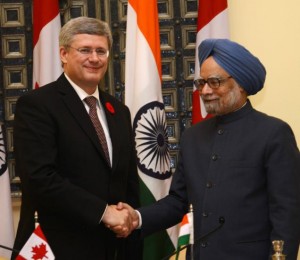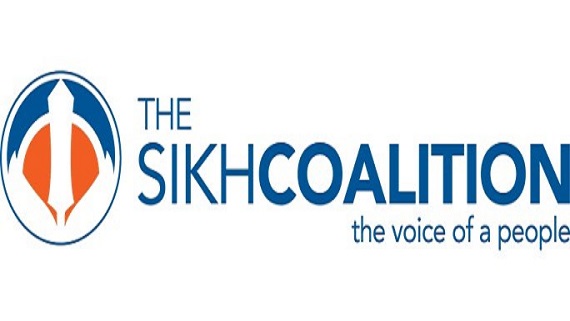Articles/Opinion
Harper and India: Conversations on extremism
November 10, 2012 | By Canadian Sikh Coalition
According to a report released by Public Safety Canada, “words such as “radical”, “radicalization”, “extremist”, “terrorist” and “terrorism” are used interchangeably by some and differentiated by others. The abundance of terms is confusing and can be misleading… Any assessment of an individual’s risk for violent extremism should be sensitive to the meaning of these terms, their differentiation from each other, and the intent of the violence.”
Canadian Prime Minister Stephen Harper recently visited India where his conversations with Indian dignitaries exemplified the difference in understanding the use of terms such as “extreme”. The Indian government has consistently raised concerns of “Sikh extremism” in Canada with their Canadian political counterparts. The Canadian Sikh community has always responded that no signs of such extremism exist and that India’s allegations are nothing but baseless accusations. This time the Prime Minister responded with a similar statement that Canada is competent in monitoring it’s internal affairs and has a close watch on any forms of violent threat. However, mere dialogue on the topic of Khalistan can not be classified as “extreme” as all Canadians are granted the freedom of expression and political association by the Charter.
Sikhs in Canada have undergone a propaganda campaign that has benefited the Indian government by inaccurately portraying the Sikh minority in Canada as a world-wide threat. However, the Public Safety Canada report defined extremism as “any political theory that holds to uncompromising and rigid policies or ideology. An extremist is a person who holds such uncompromising or rigid views or acts in a manner far beyond the norm. “Extremism” can be considered a subjective and value-laden term used with the motivation to condemn.” According to this definition, the Indian government can be viewed as an “extremist” entity. The Indian state has consistently propagated a rigid view on a non-existent “Sikh extremism” in Canada and have been uncompromising in their stance. The Khalistani movement was an actual movement that took place in India and is embedded into the history of Punjab. For individuals to have an active discourse on history is a rational process. In Canada, educational institutions encourage critical analysis on history to understand its effects and since the Khalistan movement has had lasting impacts on the Sikh community it is a necessary discussion topic. However, the Indian government has always tried to silence freedom of expression and mute any dialogue that the state interprets as “anti-Indian”. Rather than encouraging critical discourse and healthy discussions, the Indian state has violently suppressed active voices throughout the nation.
In order to maintain a power hegemony over minorities in India, the state has implemented draconian laws to suppress any form of political dissent. The Unlawful Activities Prevention Act (UAPA), is by far the most draconian law entrenched in the Indian constitution. Under this act, the government is by law allowed to impose restrictions on freedoms such as freedom of speech and expression; right to assemble peacefully; right to form associations or unions; and other freedoms in the “interests of sovereignty and integrity of India”. In the face of such unfair laws, protest and civil disobedience will often be the only course to show dissatisfaction as the citizen has been stripped of all other courses of action and freedoms that should be protected and guaranteed by the very constitution of the country in which they reside. Examples of this type of disobedience in history range from the case of an African American individual that refuses to sit in a segregated section of a public place in the United States to a Dalit refusing to walk miles for water due to segregated water wells based on the oppressive caste system still at large in India to a Sikh demanding that appropriate justice be delivered to Indian state-sponsored perpetrators of human rights violations and refusing to remain silent in Canada. In these examples the violations of the law of that time, social norms of that time or the expected behavior of that time, take place predominantly to assert dissatisfaction with the suppression of rights, rather than to fulfill the individual’s or communities interest in breaching a law or practice.
This begs the question, how can the extremist regime that is the Indian union continue to force multiple minorities to remain within its boundaries by use of draconian laws and extra-judicial murder of its citizens, while pointing fingers of extremism in foreign countries that does not exist? Do they expect Canada and Canadians to accept these types of oppressive laws? Do they want the freedoms of Canadians to be stripped away like those of minorities within the Indian Union? India has made it clear that it will not step back from it’s extremist standpoint and consider alternative viewpoints rather use violent means to ensure it’s ideology is enforced upon the entire nation. Therefore, the next time Harper visits India and the conversation of extremism arises, it would be beneficial for both parties to reconsider how they understand and define extremism.
To Get Sikh Siyasat News Alerts via WhatsApp:
(1) Save Our WhatsApp Number 0091-855-606-7689 to your phone contacts; and
(2) Send us Your Name via WhatsApp. Click Here to Send WhatsApp Message Now.
Sikh Siyasat is on Telegram Now. Subscribe to our Telegram Channel
Related Topics: Canadian Sikh Coalition, Indian State, Khalistan, Preneet Kaur, Sikh News Canada, Stephen Harper





